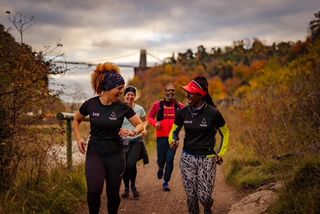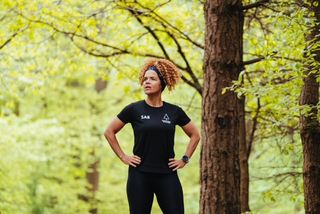How Black Trail Runners Is Making Trail Running More Diverse
You can take part in the Black To The Trails events this September to encourage a more diverse trail-running scene

Trail-running in the UK has a representation problem.
“Based on the most recent census data, 4.5% of the UK population identifies as Black or Black mix, yet less than 0.7% of people who enter trail events are Black or Black mix,” says Sabrina Pace-Humphreys, the co-founder of Black Trail Runners. “There’s massive under-representation.”
There is no quick fix to this issue, but Black Trail Runners is leading the charge to encourage more diversity on the trails. In partnership with Strava, it is hosting its first mass-participation event in September called Black To The Trails, which you can also take part in through virtual challenges on Strava.
We spoke to Pace-Humphreys to find out more about Black Trail Runners and Black To The Trails, and how people can get involved.
Why did you start Black Trail Runners?
Black Trail Runners was founded in July 2020. It came about following the murder of Ahmaud Arbery in the US in February 2020. Arbery was an avid runner. So, Black Trail Runners was created at a time when the Black Lives Matter movement was once again in the spotlight.
I moved to a market town in the Cotswolds when I was four, where there were no Black or Brown people, and I experienced racist abuse – physical and mental. I came to running in 2009, after the birth of my fourth child, as a way to manage my mental health. I had been diagnosed with postnatal depression. In 2019 I was doing a mountain trail race in the Alps and I slipped and fell and was left in need of help while five white male runners ran straight past me as if I wasn’t there. It made me question my safety in the sport. It made me question, when I’m on start lines around the world, where are the people of colour?
That led me to try and find other Black trail runners who felt the same way I did; who loved trail running and used it to manage mental health. This led me to coming together with a couple of other Black trail runners. Initially, Black Trail Runners was a community, it was a safe space. It was a place for people of colour to connect, to share the joy that they have in this sport, but also to share that lived experience of what we’ve experienced out on the trails. Whether it’s horrendous experiences, such as what I had, or whether it’s microaggressions, and how that affects our enjoyment of and our involvement in the sport.
Get the Coach Newsletter
Sign up for workout ideas, training advice, reviews of the latest gear and more.
The moment that we launched, we heard from Black people, Brown people, and white allies who felt the same. They experienced joy in trail running but wondered why there was not more representation. Why are event organisers not seeing this as a massive issue?
What events do Black Trail Runners put on?
To start with, we were in lockdown and limited in what we could do. But we started doing online events, discussions and skills workshops. One of the key areas that holds people of colour back is navigation. How can we feel safe [in the countryside] when our community has been urbanised? A high percentage of the Black community in the UK were put in cities following Windrush. Therefore, we don’t feel as though we belong in the countryside and, when we’re there, how do we know how to stay safe so we aren’t hit with the microaggressions we’re trying to get away from?
We started virtual initiatives to make the community feel connected. And then as soon as we could take that out into the real world, we did it. Now, month to month, we have our trail taster days, and we have got our first larger-scale event in Black To The Trails.
Our community now has a private Facebook group, which is a safe space for us to connect. We have monthly, quarterly and annual meet-ups. We’re just about to launch our Black Trail Runners real-life social meet-ups because our community wants more.
What barriers are put in place for Black people?
The major piece of trolling that we get, whether on a podcast or television or in a magazine, is “there are no barriers – all you need is a pair of trainers”. And it’s so far from the truth. There are barriers to access skills, and financial access barriers. Even organising this event, there are barriers being put in our way left, right and centre to getting our people from city to country.

What are your Trail Taster days? What do people need to be able to do to attend?
They don’t need to be able to do anything. All they need is to want to experience trail running. The Trail Taster days, and our community as a whole, are about inspiring and encouraging new people into trail running. People that maybe are road runners, or maybe they’re walkers and they’re like, “Oh my god, that just looks too hard.”
Our Trail Taster days are designed for the newcomer. You come for the day. Normally if transportation is a barrier then as a charity we will cover costs no questions asked. The first half of the day is working to address barriers. Normally that’s skill-based. You will have discussions about or there’ll be workshops on navigation. Or it might be about kit. You need a certain kind of shoe when you’re on the trails, so we cover the different kinds of trail shoes and what it means when they say these are more suited to mud, or technical trails. It might be about poles: what are they for? Or it might be that they’re not used to wearing a backpack. Or it might be that they think they have no idea of how to run on trails, so we cover technique.
In that first half of the day, we talk to people to get a feel for the types of barriers that they want to address. Whatever it is, we ensure that we have expert people to lead this skill stuff.
Then we have lunch, which again is all put on by us, and we go out and do a trail run. We get people out on beautiful trails. It’s important for people to understand that trail running does involve walking as well. It’s a barrier that stops people from participating. We cater for mixed-ability groups, so if you want to do a kilometre, we’ve got someone that’s going to do a kilometre with you. If you want to do 5K you can do that. If you want to do 10K you can do that. We tend to operate on a loop-back basis, just to keep the vibes high and the community together.
What is the Black To The Trails event?
It’s going to be the UK’s most diverse trail event. It is 70% people of colour who have signed up, and the rest are white allies who want to see a more diverse outdoors. We’re not calling it a trail race, it is a trail run event. The word race is a barrier. This is like a carnival on Dunstable Downs.
You will see things that you won’t see at normal running events. The music … you’re going to walk in and be like, “Wow, I recognise this beat or recognise this jam. These are my kind of people.” The food. We’re gonna have jerk chicken and rice on Dunstable Downs. It’s not your standard burger and chips. It’s food for the culture, it’s food where you know the smells and as soon as you smell them you feel, “I’m at home. This event has been curated for me.”
Then there are going to be activities on offer. We’ve got circus skills, juggling and kite-flying. You can go as a family, take your kids go and play football or table tennis or volleyball. It’s a family event where you come for the run and stay for the fun.
If you didn’t get a ticket, how else can you get involved?
We’re sold out of tickets but we’re still looking for volunteers. Get in touch with us and continue to amplify what we’re about.
The virtual Strava challenges you can join right now are the 3.1 Challenge and the Black To The Trails Virtual 5K. With the 3.1 Challenge, we as a community, globally, are going to cumulatively run 3.1 million miles throughout the month of August. So, for those that can’t get to the event, you can take part by doing the virtual 5K. Sign up to do the Back To The Trails 5K. Then you run your 5K on 11th September and you’re part of Black To The Trails!
Why is trail running so great?
I was a road runner and I came to trail running in 2016. I was in the depths of addiction and wanted to do something for my 40th birthday that didn’t involve alcohol. I decided to run the Marathon des Sables ultra-marathon. So, 2016 was the first time I ever went to the trails and the day I did I was like, “Why did no one ever tell me about this?”
If you are a road runner and have been in the whole club thing then maybe, like me, you found that it became detrimental to your mental health – in terms of constantly working to get faster, get stronger, and beat your PBs. You can forget about all that when you get to the trails because your road pace is not going to translate to trail running, and there’s something beautiful about that. It humbles you – you have to listen to your body. It’s one of the most joyful experiences I think you can have moving your body outdoors.
How has Strava helped support Black Trail Runners?
We’re not interested in speaking to any brand or any organisation, no matter how large or small, if all they’re interested in is performative allyship. We’re not here for that. What we’re here for is action.
From the moment the people at Strava made contact with me, everything they said they were going to do they’ve done. Last year, the first big project that we did with them was the Strava challenge, the 4.5 challenge. As volunteers, a massive barrier for us is having the financial resources in order to be out there telling people about what we do and getting the logistical set-up to hold our events. We need the help … to hire marquees, to get event space, to ensure that our community can be transported to Trail Taster days … That 4.5 challenge enabled us to have funding to be able to continue to do what we do. We don’t need more kit, we don’t need more trainers, right now. We don’t need T-shirts. What we need is financial and human resources and that’s what the Strava partnership has done for us.

Nick Harris-Fry is a journalist who has been covering health and fitness since 2015. Nick is an avid runner, covering 70-110km a week, which gives him ample opportunity to test a wide range of running shoes and running gear. He is also the chief tester for fitness trackers and running watches, treadmills and exercise bikes, and workout headphones.
